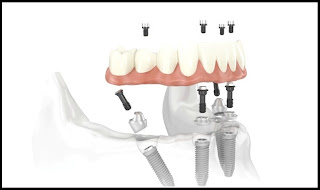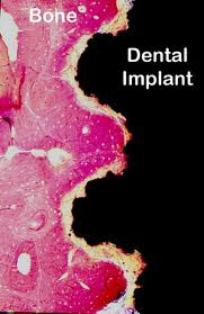Welcome to the second half of this article series on the various steps one can take to drastically improving the quality of their smile, short of getting new teeth! In Part 1, a New Jersey dental implants surgeon explained the incredible benefits good oral hygiene, a professional teeth cleaning and frequent visits to the dentist can have upon the appearance of your smile. Good oral health is first and foremost what keeps your teeth and gums looking beautiful!
The next step for those who are essentially in good oral health but who still have discolored teeth would be a professional teeth whitening treatment, which can be done in-office or in the comfort of your own home. Now, in Part 2, we shall look at some of the restorative dental options for people who are simply not happy with their smiles.
Camouflage Imperfection with Dental Veneers
 "Dental veneers are wonderful cosmetic restorations that can make it look like you have new teeth," says the New Jersey dental implants surgeon. "The concept is the same as covering a battered, stained table with a beautiful table cloth. Veneers are ultra-thin shells of ceramic material that are custom-made to fit over the outer surface of a tooth. The tooth surface is typically prepared by being slightly ground down or reduced, so that there is space to accommodate the thickness of the veneer. The veneer is then cemented in place, effectively covering up the appearance of surface and deep stains and any imperfections in the actual tooth structure, including chips, cracks, and erosion."
"Dental veneers are wonderful cosmetic restorations that can make it look like you have new teeth," says the New Jersey dental implants surgeon. "The concept is the same as covering a battered, stained table with a beautiful table cloth. Veneers are ultra-thin shells of ceramic material that are custom-made to fit over the outer surface of a tooth. The tooth surface is typically prepared by being slightly ground down or reduced, so that there is space to accommodate the thickness of the veneer. The veneer is then cemented in place, effectively covering up the appearance of surface and deep stains and any imperfections in the actual tooth structure, including chips, cracks, and erosion."
"Veneers not only improve the appearance of a worn and/or stained tooth, making it look new, they also reinforce the strength of a tooth that has been damaged. By covering up cracks, chips and areas of erosion, the tooth structure is effectively protected against infiltration by oral bacteria, thereby rendering it stronger and more likely to withstand decay. For this reason, veneers aren't only cosmetic in benefit."
Completely Restore With Dental Crowns
 "The last measure that can be taken to restore a damaged and/or decayed tooth is a dental crown, with or without root canal therapy depending upon the recommendations of your dentist," says the dental implants surgeon in New Jersey. "Dental crowns are used to replace the visible portion of teeth that have become so damaged or decayed that a significant portion of it needs to be removed. The crown is custom made to fit the remaining tooth and resume its appearance and function."
"The last measure that can be taken to restore a damaged and/or decayed tooth is a dental crown, with or without root canal therapy depending upon the recommendations of your dentist," says the dental implants surgeon in New Jersey. "Dental crowns are used to replace the visible portion of teeth that have become so damaged or decayed that a significant portion of it needs to be removed. The crown is custom made to fit the remaining tooth and resume its appearance and function."
A Final Note
"Many celebrities with gorgeous smiles have had many, most or even all of their teeth capped with crowns. Yet in spite of the benefits of these and all of the cosmetic treatments discussed really - aside from teeth whitening - the very best approach to maintaining a beautiful and healthy smile is a good standard of oral hygiene and frequent visits to the dentist and oral hygienist. Nothing can rival the strength, beauty, resilience and comfort of your own biological technology, so make sure you take all the necessary measures to keep it in fantastic lifelong condition. Do this and you won’t be likely to face the need for new teeth!"
 Smiling is a fundamental tool for human communication, so if your teeth are preventing you from doing it with confidence, it’s time to learn about what can be done to improve your situation. You don’t necessarily need to get new teeth! Here’s what a Rutherford dental implants surgeon has to say about getting back a confident smile!
Smiling is a fundamental tool for human communication, so if your teeth are preventing you from doing it with confidence, it’s time to learn about what can be done to improve your situation. You don’t necessarily need to get new teeth! Here’s what a Rutherford dental implants surgeon has to say about getting back a confident smile! “If your teeth are essentially healthy, but still appear an unattractive yellow it’s most likely that they have become stained or discolored through repeated exposure to the tannins and dyes in the foods and beverages you consume. Coffee, tea, dark berries, sodas or anything with dark pigmentation can cause your teeth to become permanently stained,” explains the Rutherford dental implants surgeon.
“If your teeth are essentially healthy, but still appear an unattractive yellow it’s most likely that they have become stained or discolored through repeated exposure to the tannins and dyes in the foods and beverages you consume. Coffee, tea, dark berries, sodas or anything with dark pigmentation can cause your teeth to become permanently stained,” explains the Rutherford dental implants surgeon.
 All of this can sound somewhat frightening. No one enjoys the prospect of oral surgery, so the very best philosophy New York residents living with diabetes can adopt is to prevent rather than cure! “If you have been diagnosed with diabetes you must first accept that you will need to spend a little more time and spend a little more effort on looking after your teeth and gums,” explains a new teeth specialist in New York. “You should tell your dentist about your condition and ask him or her for advice on home oral hygiene care. You will also need to go for more frequent check-ups and professional cleanings as a part of the preventative healthcare regime that will keep your oral health in check.”
All of this can sound somewhat frightening. No one enjoys the prospect of oral surgery, so the very best philosophy New York residents living with diabetes can adopt is to prevent rather than cure! “If you have been diagnosed with diabetes you must first accept that you will need to spend a little more time and spend a little more effort on looking after your teeth and gums,” explains a new teeth specialist in New York. “You should tell your dentist about your condition and ask him or her for advice on home oral hygiene care. You will also need to go for more frequent check-ups and professional cleanings as a part of the preventative healthcare regime that will keep your oral health in check.” “The great thing about the All-On-4 is that nearly every patient that walks in the doors of a dental implant center is a candidate for this procedure,” explains a dental implant professional in New Jersey. “Even if he or she has been wearing dentures for five or ten years and has been previously told by his or her dentist that they are not a candidate for dental implants. The ‘All-On-4™’ is specifically designed to provide great solutions for a group of people who formerly were not considered ideal candidates for implants.”
“The great thing about the All-On-4 is that nearly every patient that walks in the doors of a dental implant center is a candidate for this procedure,” explains a dental implant professional in New Jersey. “Even if he or she has been wearing dentures for five or ten years and has been previously told by his or her dentist that they are not a candidate for dental implants. The ‘All-On-4™’ is specifically designed to provide great solutions for a group of people who formerly were not considered ideal candidates for implants.” There are only a handful of rare medical conditions that might compel a dental implant professional in New Jersey to reconsider surgery. The safety of every patient is a primary concern of any surgeon, so if you have a blood clotting disorder, severe respiratory disease or a serious heart condition, it may not be in your best interest to proceed with treatment. Additionally, certain bone disorders and conditions, such as uncontrolled diabetes, might increase your risk of implant failure. Should this risk be too high, it may not be wise to undergo such a procedure.
There are only a handful of rare medical conditions that might compel a dental implant professional in New Jersey to reconsider surgery. The safety of every patient is a primary concern of any surgeon, so if you have a blood clotting disorder, severe respiratory disease or a serious heart condition, it may not be in your best interest to proceed with treatment. Additionally, certain bone disorders and conditions, such as uncontrolled diabetes, might increase your risk of implant failure. Should this risk be too high, it may not be wise to undergo such a procedure.























